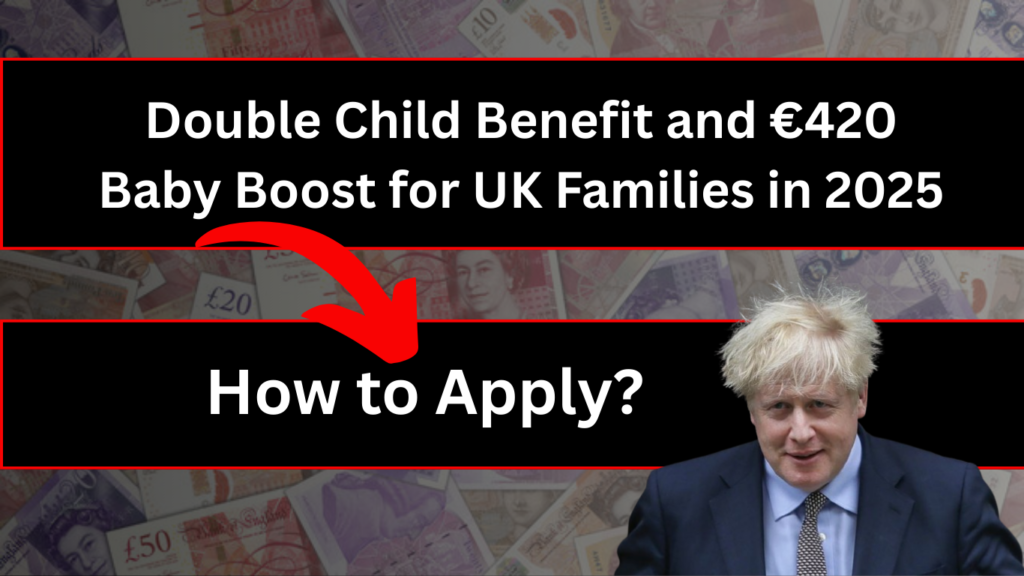In 2025, families across the United Kingdom and Ireland will see increased financial support for children. The UK government has announced a temporary Double Child Benefit payment, while Ireland has introduced a €420 Baby Boost for new parents. Both measures aim to reduce the financial burden of parenting amid rising living costs.
In this comprehensive guide, we clearly explain what these benefits include, who qualifies for the payments, and the steps you must follow to claim them. Whether you’re welcoming your first child or looking to make the most of available family support, we’ve got all the information you need.

UK Double Child Benefit & €420 Baby Boost in 2025
Raising children brings joy—but it can also come with significant financial pressures. To help ease these costs, governments in the United Kingdom and Ireland have introduced enhanced family support measures for 2025. The UK will temporarily provide double Child Benefit payments, while Ireland is rolling out the new €420 Baby Boost.
It’s important to understand who qualifies, ensure you claim within the specified deadlines, and keep all necessary documentation handy. Even families with higher incomes should consider applying, as these benefits can provide additional long-term advantages, including entitlement to pension credits.
| Benefit | Details |
| UK Double Child Benefit | Issued in Nov & Dec 2024 as a cost-of-living support measure. No separate application required. Standard weekly rates increased in 2025. Claim here |
| Ireland €420 Baby Boost | One-off payment combining €280 New Baby Grant + €140 first Child Benefit payment. For babies born or adopted on/after Dec 1, 2024. More info |
| Backdating | Both UK and Ireland allow up to 3 months of backdated claims if eligibility is met. |
| Income Considerations | UK parents earning £50,000+ may face a High-Income Child Benefit Charge (HICBC) but should still claim to secure National Insurance credits. |
| Automatic Payments | Ireland’s Baby Boost is auto-triggered if the baby is registered within 3 months. Existing Child Benefit recipients in the UK or IE will have new children added to their claim automatically in most cases. |
UK Double Child Benefit & €420 Baby Boost in 2025
Raising children brings joy—but it can also come with significant financial pressures. To help ease these costs, governments in the United Kingdom and Ireland have introduced enhanced family support measures for 2025. The UK will temporarily provide double Child Benefit payments, while Ireland is rolling out the new €420 Baby Boost.
It’s important to understand who qualifies, ensure you claim within the specified deadlines, and keep all necessary documentation handy. Even families with higher incomes should consider applying, as these benefits can provide additional long-term advantages, including entitlement to pension credits.
Who Is Eligible for UK Double Child Benefit in 2025?
You can claim Child Benefit if you:
- Are responsible for a child under 16 years old, or under 20 years if they remain in approved education or training.
- Live within the United Kingdom.
- Note: Only one person can claim benefit payments per child.
High-Income Considerations: HICBC
If you or your partner earns over £50,000 annually, the High-Income Child Benefit Charge (HICBC) applies:
- £50,000 to £60,000: Partial repayment through increased tax.
- Over £60,000: Full repayment via tax.
- Even if you expect repayment, claiming ensures you receive National Insurance credits, protecting your future State Pension entitlement.
How to Claim the UK Child Benefit (Step-by-Step)
- Download the CH2 form.
- Include your child’s birth or adoption certificate.
- Mail your completed form and documents to the Child Benefit Office.
- Claims can be backdated up to 3 months.
Already claiming for another child? New children will typically be added automatically—no additional application needed.
Ireland: €420 Baby Boost in 2025
What Is the Baby Boost?
Announced in Budget 2025, Ireland’s Baby Boost is a special one-off payment designed to support new parents whose child was born or adopted on or after December 1, 2024.
Payment Breakdown:
- €280 New Baby Grant
- €140 Monthly Child Benefit
- Total One-Off Payment: €420
Eligibility Criteria:
- Child born or adopted on or after December 1, 2024.
- Parents must be resident in Ireland.
- Must meet the Habitual Residence Condition (HRC).
- Children must be under 16 years, or under 18 years if in full-time education or having a disability.
How to Claim:
- Register your baby’s birth within 3 months.
- First-time parents: The Department of Social Protection (DSP) will send you a pre-filled CB1 form.
- Existing Child Benefit claimants: Your new child is automatically added.
- For births abroad or late registrations, apply directly via the Child Benefit Section.
Additional Information:
- For twins: payment is €560; for triplets, it’s €840.
- Payments occur on the first Tuesday of each month.
- Claims can be backdated up to 3 months.
FAQs
- Is the UK Double Child Benefit still available in 2025?
No. The double Child Benefit payments were temporary measures for November and December 2024 only. However, the standard benefit rates increased permanently from April 2025.
- Will Ireland’s Baby Boost continue each year?
Currently, the €420 Baby Boost is a one-time initiative included in Budget 2025. There is no certainty it will continue in future budgets.
- Can I claim the Baby Boost if I reside abroad but my child was born in Ireland?
No. To be eligible, you must meet Ireland’s Habitual Residence Condition (HRC).
- What if I missed claiming the UK Child Benefit last year?
You can backdate your UK Child Benefit claim for up to 3 months from the application date.
- Should I still claim Child Benefit if I have to repay it due to high income?
Yes. Claiming Child Benefit is beneficial because it provides National Insurance credits, safeguarding your eligibility for the State Pension even if you must repay the benefit through the High-Income Child Benefit Charge (HICBC).
Admin at Sirfal.com – Experienced blogger since 2015, sharing Q&A content and latest job updates.